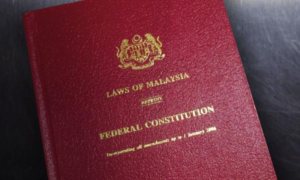No.
Before I explain why, let me explain how and when an emergency ordinance can come to an end.
There are three ways:
- revocation by the Yang di-Pertuan Agong (YDPA) under Article 150(3) of the Federal Constitution;
- annulment by Parliament under Article 150(3); or,
- automatic lapsing six months after the Proclamation of Emergency ends under Article 150(7).
Today, the Minister in the Prime Minister’s Department (Parliament and Law) said that the 2021 Emergency Ordinances were revoked on 21 July, thus obviating the need to lay them before Parliament for debate.
Let us take a closer look at Article 150(3):
(3) A Proclamation of Emergency and any ordinance promulgated under Clause (2B) shall be laid before both Houses of Parliament and, if not sooner revoked [emphasis added], shall cease to have effect if resolutions are passed by both Houses annulling such Proclamation or ordinance, but without prejudice to anything previously done by virtue thereof or to the power of the Yang di-Pertuan Agong to issue a new Proclamation under Clause (1) or promulgate any ordinance under Clause (2B).
The honourable minister is correct to say that, if the Ordinances were revoked, they need not be laid before Parliament.
But, have the Ordinances been revoked, as claimed?
Revocation does not take effect just by reciting a magic chant. It is a legislative act; it requires that legal rules be followed.
The Interpretation Act 1948/67 (IA) is instructive here.
Section 65 of the IA applies to any written law before 18 May 1967 and to subsidiary legislation made under such written law. Section 66 defines “subsidiary legislation” to include a proclamation, rule, regulation, order, notification, by-law, or other instrument made under any act of parliament, ordinance, enactment, or other lawful authority, and having legislative effect.
Written law here includes the Federal Constitution. Under Article 160(1), read with the Eleventh Schedule of the Constitution, the authority to revoke the ordinances is the same authority that made them: the YDPA.
Further, concerning subsidiary legislation, section 86(1) of the IA states that it must be published in the Gazette and shall take effect and come into operation as law on the date of such publication.
So, have the Ordinances been revoked?
First, there is no evidence that the YDPA has revoked the Ordinances. The YDPA must act on the advice of the Cabinet, and he must be presented with the revocation to agree with the same. The Cabinet cannot act on its own and bypass the YDPA.
Second, there has been no publication of the purported revocation in the Gazette.
For these reasons, the Emergency Ordinances have not been revoked and are still in force.
The next question then is, can the Emergency Ordinances be revoked now, given that Parliament is sitting?
I do not think so. It is implicit in Article 150(3) that once Parliament sits, the Proclamation of Emergency and the ordinances made thereunder must be laid before the House for a vote. The government does not have the discretion to do otherwise.
Any revocation must be done before Parliament sits. Once Parliament is in session and no revocation had taken place, only Parliament can annul the ordinances. Otherwise, the words “if not sooner revoked” become obsolete.
These seemingly technical distinctions carry significant political ramifications.
There is a high likelihood that Parliament will vote down the Emergency — a damning indictment on the Prime Minister and his government regarding their conduct thus far. Losing the emergency test in Parliament is akin to losing a confidence vote. By convention, in the Westminster system, the Prime Minister will have to resign.
See reports by BFM, Malaysiakini, and Malay Mail for other views on whether the Emergency Ordinances have indeed been revoked.




